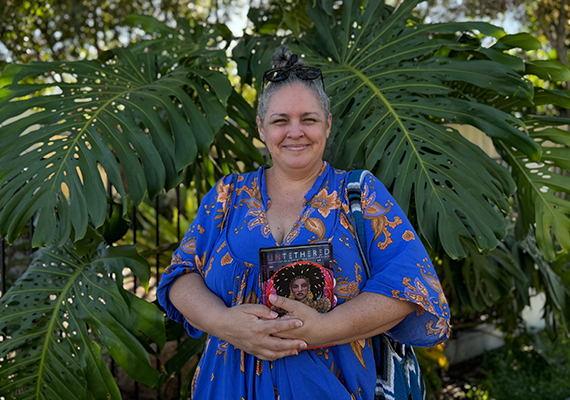
As an anthropologist and creative writer of speculative fiction, Dr Kirsten McGavin hopes to shine a light on Pacific histories, culture and identity through her postdoctoral research. We caught up with her to gain a better understanding of how this research has come about and why it’s so important to our own Australian history books.
What brought you to Flinders?
Flinders Professor Penny Edmonds is one of the Chief Investigators on an ARC Discovery Grant (Unfreedom, Voices, Redress: Plantation Cultures of the Western Pacific), which brings together a multidisciplinary team of researchers from across Australia, Fiji and Germany. And I was lucky enough to be welcomed as part of that team, as their postdoctoral researcher. I know Penny and the other CI’s were really keen not only to have Pasifika scholars play key roles in the project, but also to incorporate new kinds of research methods and practice.
Can you tell us a bit about your postdoctoral project?
My research draws inspiration from historical Pacific records, archives and artefacts, and combines key findings from these with contemporary cultural knowledge from the Pacific (especially Papua New Guinea) in order to create original speculative fiction. Essentially, I’m merging anthropological research methods with creative writing practice.
Have you always been interested in science fiction and fantasy writing?
Yes! Since I was small. Remember seaQuest DSV? I’d write fan fiction before I even knew that was a thing. I was always a writer. My stories would often involve fantastical elements like anthropomorphic animals, aliens, magic, or advanced tech. I remember watching Robotech or Wonder Woman after school and then immediately getting my notebook out to draw pictures or write stories to go with reimagined plotlines.
Why is it important that we explore Pacific histories, culture and identity?
To some extent, Pacific history (especially the last couple of hundred years or so in terms of colonisation and migration) is also Australian history. Exploring these elements, as well as Pacific cultures and identity, helps to: 1) build a broader understanding of and respect for the richness and diversity of Pasifika experiences and perspectives, 2) challenge stereotypes and misconceptions, and 3) promote cultural pride and people’s sense of belonging. It means that Pacific voices are recognised and valued in both local and regional contexts.
Favourite novel of all time?
I’m not sure that I actually have one! I like so many different books (both fiction and non-fiction) for all different reasons. Black, White, Other by Lise Funderburg is not a novel but I read that thing from cover to cover so many times as it was the first time I really felt represented in a book. My favourite TV show though is definitely Lovecraft Country. I also love the Wonder Woman ’77 comic book series, for the nostalgia and because of the beautiful artwork.
Tell us about your ideal weekend.
Lots of relaxing, going to the movies, going to lunch, lots of cold drinks and sunshine, maybe a swim, and shopping (even if it’s just window shopping).

